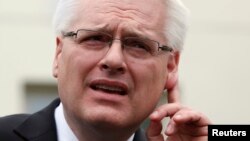Croatia, the European Union's newest member, is set to vote for a new head of state December 28, with none of the four candidates vying for the largely ceremonial post seems likely to secure an outright victory according to polls.
Incumbent Ivo Josipovic, supported by the ruling Social Democrats, is seen as a frontrunner even though the government's failure to halt economic decline has eroded the party's popularity.
Josipovic has campaigned on a platform proposing constitutional changes, saying that a more decentralized and democratic country is needed to help the economy find a way out its sixth year of recession.
“Today we have an entire generation of young people who are no longer concerned with asking whose side one was on in 1941 or in 1991, they are concerned with where to get jobs. I want to learn from them, I want to live with them, and I want to see us giving them a future together. Let's not forget that we have merely borrowed Croatia from future generations, and it is our obligation to solidify the foundations of the country, and without doing that, we cannot find a way out of the economic crisis,” Josipovic told a rally in Zagreb in December, referring to political divisions in Croatian society over the legacy of World War II and the independence war of the 1990s.
Josipovic, a jurist and composer of classical music, tops the opinion polls ahead of the vote but will probably face a run-off poll on January 11 against Kolinda Grabar-Kitarovic from the conservative Croatian Democratic Union (HDZ), the biggest opposition party.
Grabar-Kitarovic is a former foreign minister, ambassador to Washington and a NATO official.
“We are going to move Croatia forward, because only we, not foreigners, only we, Croatian citizens, together with our diaspora, only we can - using our patriotism, our zeal for our homeland, our efforts - only we can move our Croatia forward, and take it to its place among the most developed countries of the world, and not where it is today, at the bottom of all rankings,” Grabar-Kitarovic told supporters on the campaign trail in Grobnik.
Opposition politicians have faulted Josipovic for failing to criticize the government's largely failed economic policies.
The former Yugoslav republic, which joined the EU in July last year, has had six years of recession with prospects of zero growth in 2015, and voters on the streets of Zagreb said the economy and high unemployment rate were their main concerns.
“In the economy, the economy [is what needs improvement]. You can see that young people are moving abroad, there are no jobs. I have two daughters, and they do not work. Neither of them has a job. Thank god, one of them has a good husband, who does have a job,” pensioner from Zagreb, Katarina Florijan, said.
One voter said he was disillusioned with candidates and parties on offer and was thinking of staying at home.
“I discussed it (the election) with my cousin, and I don't think we will vote at all. And maybe nobody should vote, so that we see some change. Because it looks like the Croatian Democratic Union will win power again [in the next parliamentary election], and, unfortunately, it will all be the same story again, I think,” small business owner Eduard Niksic said.
Croatia's president has a say in foreign policy and intelligence and is supreme commander of the armed forces, but has no power to veto laws.





